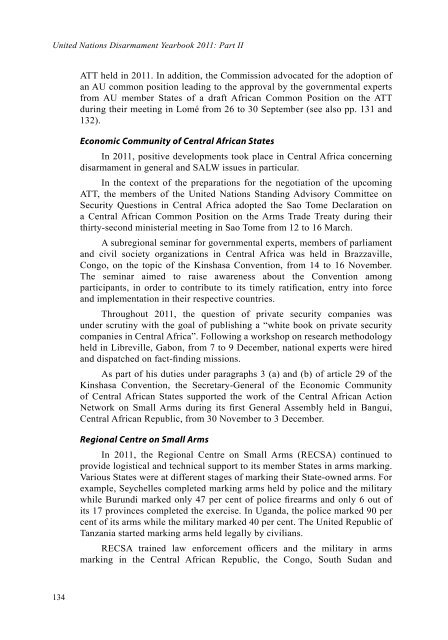DYB2011-Part-II-web
DYB2011-Part-II-web
DYB2011-Part-II-web
Create successful ePaper yourself
Turn your PDF publications into a flip-book with our unique Google optimized e-Paper software.
United Nations Disarmament Yearbook 2011: <strong>Part</strong> <strong>II</strong><br />
134<br />
ATT held in 2011. In addition, the Commission advocated for the adoption of<br />
an AU common position leading to the approval by the governmental experts<br />
from AU member States of a draft African Common Position on the ATT<br />
during their meeting in Lomé from 26 to 30 September (see also pp. 131 and<br />
132).<br />
Economic Community of Central African States<br />
In 2011, positive developments took place in Central Africa concerning<br />
disarmament in general and SALW issues in particular.<br />
In the context of the preparations for the negotiation of the upcoming<br />
ATT, the members of the United Nations Standing Advisory Committee on<br />
Security Questions in Central Africa adopted the Sao Tome Declaration on<br />
a Central African Common Position on the Arms Trade Treaty during their<br />
thirty-second ministerial meeting in Sao Tome from 12 to 16 March.<br />
A subregional seminar for governmental experts, members of parliament<br />
and civil society organizations in Central Africa was held in Brazzaville,<br />
Congo, on the topic of the Kinshasa Convention, from 14 to 16 November.<br />
The seminar aimed to raise awareness about the Convention among<br />
participants, in order to contribute to its timely ratification, entry into force<br />
and implementation in their respective countries.<br />
Throughout 2011, the question of private security companies was<br />
under scrutiny with the goal of publishing a “white book on private security<br />
companies in Central Africa”. Following a workshop on research methodology<br />
held in Libreville, Gabon, from 7 to 9 December, national experts were hired<br />
and dispatched on fact-finding missions.<br />
As part of his duties under paragraphs 3 (a) and (b) of article 29 of the<br />
Kinshasa Convention, the Secretary-General of the Economic Community<br />
of Central African States supported the work of the Central African Action<br />
Network on Small Arms during its first General Assembly held in Bangui,<br />
Central African Republic, from 30 November to 3 December.<br />
Regional Centre on Small Arms<br />
In 2011, the Regional Centre on Small Arms (RECSA) continued to<br />
provide logistical and technical support to its member States in arms marking.<br />
Various States were at different stages of marking their State-owned arms. For<br />
example, Seychelles completed marking arms held by police and the military<br />
while Burundi marked only 47 per cent of police firearms and only 6 out of<br />
its 17 provinces completed the exercise. In Uganda, the police marked 90 per<br />
cent of its arms while the military marked 40 per cent. The United Republic of<br />
Tanzania started marking arms held legally by civilians.<br />
RECSA trained law enforcement officers and the military in arms<br />
marking in the Central African Republic, the Congo, South Sudan and


